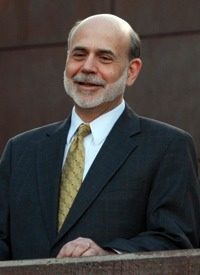
After more than two years of intervention in the economy by the Federal Reserve, the economy is showing signs of sliding back into recession. This, of course, is precisely what sober minds — like Congressman Ron Paul and financial analyst Peter Schiff — have been predicting all along. But it’s news to the likes of Fed Chairman Ben Bernanke, who on August 27 pledged to take whatever measures are needed to jolt the somnolent economy back to wakefulness.
As Bernanke ruefully told the Federal Reserve Bank of Kansas City Symposium in Jackson Hole, Wyoming:
Although private final demand, output, and employment have indeed been growing for more than a year, the pace of that growth recently appears somewhat less vigorous than we expected….
Incoming data on the labor market have remained disappointing. Private-sector employment has grown only sluggishly, the small decline in the unemployment rate is attributable more to reduced labor force participation than to job creation, and initial claims for unemployment insurance remain high. Firms are reluctant to add permanent employees, citing slow growth of sales and elevated economic and regulatory uncertainty….
Overall, the incoming data suggest that the recovery of output and employment in the United States has slowed in recent months.
Bernanke proceeded to reassure his audience that the Federal Open Market Committee (FOMC), the entity responsible for the sale and purchase of government debt to manipulate the money supply (formally known as open market operations), still has a number of options to combat market malaise, should the economy turn recessionary again. In other words, the FOMC is prepared yet again to ratchet up the issuance of credit and the creation of money to provide additional fiscal stimulus to the stubbornly sluggish economy.
But Bernanke and his epigones are basing their policy decisions on a false premise, namely, that fiscal policy is the indispensable determiner of market health. Without enlightened fiscal activism — on the part of central banks, treasuries, and lawmakers — the free market will verge into chaos; so, at least, goes the article of faith of supply-siders and demand-siders, Keynesians and monetarists alike.
In truth, fiscal stimuli serve only to distort the workings of the free market and, in the case of stimuli intended to palliate or stave off recession, only postpone the evil day. For the markets have already decided that pricing and asset valuations were and are wildly out of whack. The stock market with its historically high price-to-earnings ratio, a real estate market where houses were “flipped” for enormous profits, and a consumer culture run amok amid a riot of cheap credit — none of these conditions squared with reality or reason. The moment the latter caught up with the former, the long-anticipated correction began.
And that correction will continue irrespective of Bernanke’s fiscal legerdemain. No amount of zero interest rate incentives can persuade consumers to borrow or banks to lend if the general perception has become (and it has) that nearly everything is overpriced, overleveraged, and overvalued. Only when prices and asset valuations decline to reflect sane valuations will the correction wind down.
The longer the Fed insists on trying to spare us the collective pain of an economic hangover, the longer the economic crisis will linger. Given the track record of countries like Argentina, whose economy has been in the doldrums for decades, there can be no assurances that the Fed’s defrocked financial clerics will see the light anytime soon and allow the markets to find their own way back to sanity.
Photo of Fed Chairman Ben Bernanke: AP Images



